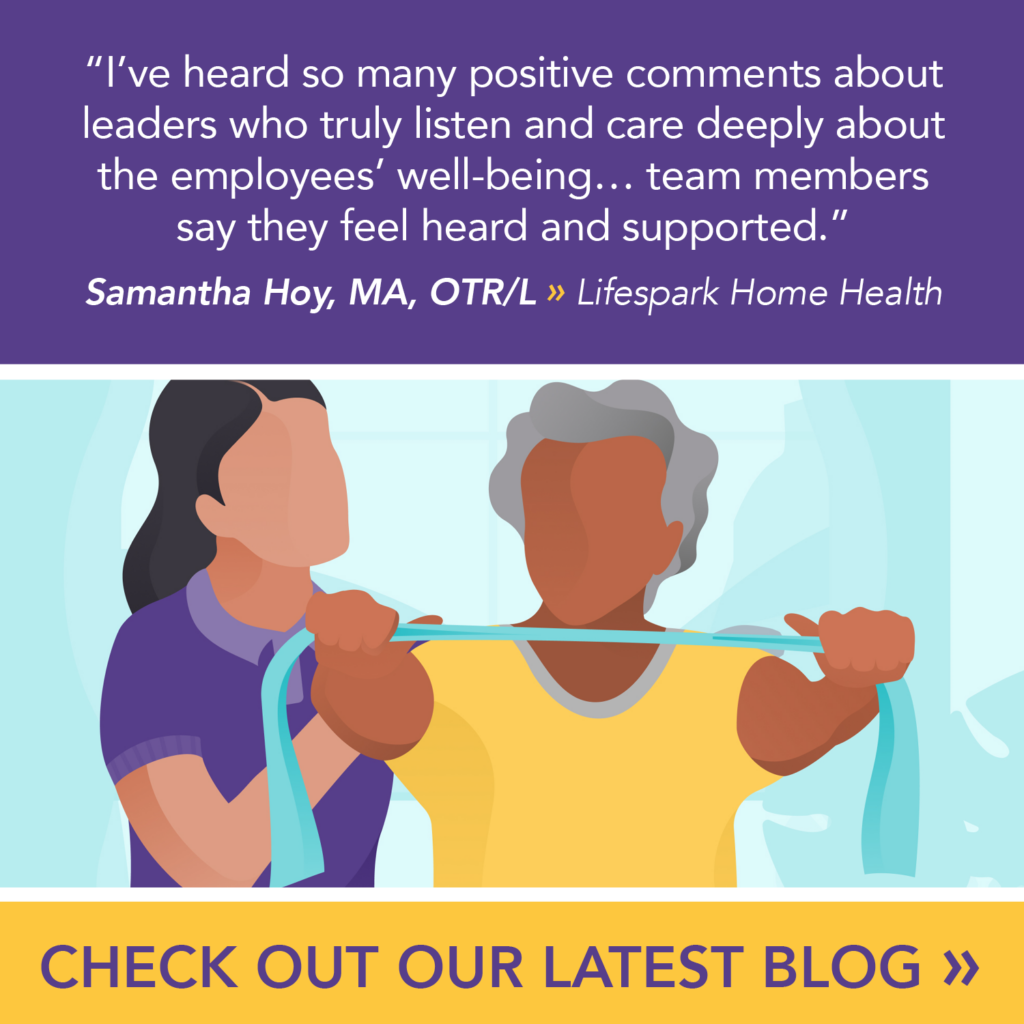
When Jill Arvidson, MST, CCC-SLP, Lifespark Skilled Home Health Administrator, pivoted her career from the clinical setting to home health in 2007, she realized that home is where the majority of older clients want to get care. “They don’t want to go to the hospital, TCU [transitional care unit], or skilled nursing facility—they want to recover and stay well in their own home,” she said.
That wasn’t always the case. As recently as 25 years ago, if a client didn’t want to be hospitalized, the discussion would quickly turn to comfort care or hospice. But over the years, home health providers have proven to have the skills and expertise to take care of even the most complex individuals in their homes, with the support of other in-home services. “The concept of aging in place is a core goal of home health,” Jill said.
Although not a replacement for hospitals or skilled nursing facilities, home health has been shown—especially during the COVID-19 pandemic—to be equally, if not more, effective at helping people progress with their recovery and stay out of the hospital.
Creative mindset
At Lifespark Home Health, creativity is an essential part of the culture. “We do a good job of challenging our staff to come up with alternative solutions if a certain therapy, exercise, or approach isn’t working for the client,” Jill said. “A clinician who sticks rigidly to their original strategy does a disservice to the people in their care.”
For individuals with swallowing disorders, for example, thickened or pureed food is typically the safest option. But if a client isn’t willing to go that route, it’s up to the speech therapist to help them learn how to eat safely. “We don’t give up on our clients,” she said.
Clinicians, not technicians
Jill has found that recruiting the right staff to work with seniors in their homes requires specific social and behavioral strengths, as well as clinical expertise. “We believe in hiring good humans—people who have integrity, who are flexible, both from a clinical and scheduling perspective, and who can provide the highest level of care without having all the details,” she said. Other important qualities include a passion for learning and a desire to be part of a team rather than the star player. “We’re all in this together—that’s how we make it work.”
Misconceptions about home health can make it challenging to attract the best candidates. “There’s a misguided belief that home health won’t use your skills and knowledge. But in truth, if you work in an orthopedic clinic, you’re going to prescribe the exact same set of exercises for every knee replacement,” she said. “In home health, you see a vast range of clients, capabilities, home environments, and support systems, all of which demand the full scope of your professional license and assessment skills.”
Engagement post-COVID
For professionals looking for independence and autonomy, home health offers distinct advantages over other settings but is, by nature, more isolated with fewer built-in opportunities to connect with coworkers on a personal level, said Samantha Hoy, MA, OTR/L, Lifespark Home Health Regional Manager. “Then, when COVID hit, and all our internal meetings went virtual, those opportunities disappeared,” she said.
Once COVID-19 restrictions were lifted in late 2022, Sam and her fellow managers were given the green light to bring people back together, something they had done regularly before the pandemic. A small group (a.k.a., the Engagement Committee) started brainstorming ideas to reengage employees.
“We wanted to recreate the best of clinic-based work within the home health space and also find ways to show our appreciation for the team’s incredible dedication during such a rough time,” Sam said. Another goal was to give new employees, those who had been hired during the pandemic, a chance to meet their colleagues in person.
In-person connections
The committee’s first events were a series of territory-specific happy hours, all optional, where team members could get together after work in a relaxed atmosphere, debrief about their days, learn about each other’s roles, talk about their challenges, and just kick back.
“There was such a great response from the happy hours that we started sending out monthly emails listing fun events happening across the Metro area,” she said. “The idea was to offer employees a variety of free or low-cost activities to fill their cup.” Some events, like a recent beer dabbler, cater to adults, but most are family-oriented, such as hayrides at an apple orchard, pick-your-own-pumpkin patches, and holiday light shows.
The Engagement Committee also hosts four or five virtual activities each month, such as email trivia and photo contests, and this past summer, they made lunch for the Home Health staff in the Lifespark parking lot, along with games, music, and prizes. “We’re trying to facilitate different ways to stay connected which is especially important as our division continues to grow,” Sam said.
Empathy and listening
The efforts of the Engagement Committee would ring hallow if not for overall culture in Home Health. “I’ve heard so many positive comments about empathetic leaders who truly listen and care deeply about the employees’ well-being,” Sam said. “We all have daily expectations to meet and roles to play, but team members say they feel heard and supported.”
Although there’s always some degree of staff turnover, Sam believes that Lifespark’s culture has helped build a more stable, consistent work force.
Learn more at Lifespark Skilled Home Health. To explore open positions, visit our Careers page.


